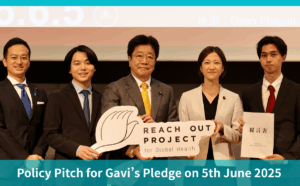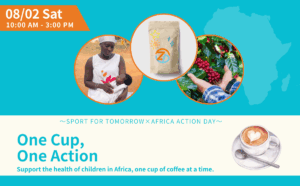Ensuring global vaccine coverage for children remains an urgent global health priority. From 2019 to 2021, the number of “zero-dose children”, those who have not received a single dose of any vaccine increased by nearly 40%, from 13 million to 18 million, placing their lives and health at serious risk.[1]Reducing the number of zero-dose children is a key target of the global Immunization Agenda 2030 (IA2030), and Japan has significantly contributed to this international goal through substantial financial support. The Japanese government provides funding to global organizations such as WHO, UNICEF, and Gavi, the Vaccine Alliance. Specifically, Japan contributed USD 100 million to Gavi’s fifth replenishment (2021–2025), and an additional USD 1.5 billion to COVAX, Gavi’s COVID-19 vaccine initiative.[2][3]These contributions have earned Japan recognition from the global community and a leadership position as an “anchor donor” on the Gavi Board. With COVAX concluding its operations in 2023, Japan’s continued support through Gavi’s upcoming sixth round of funding (2026–2030) will be essential for sustaining global vaccine efforts. To ensure this continued commitment, support from the Japanese public and especially from the youth generation will be crucial.
Previous surveys have shown that Japan’s younger generations are more open to international cooperation. In a public opinion survey by the Cabinet Office, 45% of respondents in their 20s said Japan should actively promote international cooperation which was significantly higher than the overall average of 30%. Another recent study showed that about 70% of high school students support Japan’s international aid efforts.[4]However, awareness of global health issues including Gavi and zero-dose children remains limited in Japan.
To address this gap, the youth-led organization Reaching Zero-Dose Children conducted a survey targeting Japanese youth under age 30, with a particular focus on students in medical and healthcare-related fields. The aim was to assess awareness of Gavi and zero-dose children. The findings reflect the voices of Japan’s younger generations and will be used as evidence to inform policy and raise awareness within Japan.
The survey was conducted online via Google Forms between June 5 and June 17, 2025. A total of 88 responses were collected from medical and graduate students specializing in medical adjacent fields across Japan (28 male, 60 female).
Key Findings
High Interest in Global Health Issues:
Nearly half (48.9%) of respondents expressed interest in global health issues such as infectious diseases and vaccination. When asked, “Do you think it is important that all children in the world receive vaccines?”, 78.4% responded “Very important”, highlighting the widespread empathy for childhood vaccination efforts.
Low Awareness of Gavi, the Vaccine Alliance:
Despite the high interest in global health, awareness of Gavi was strikingly low. A total of 89.8% of respondents said they were “not aware” of Gavi. In contrast, awareness of the Japanese government’s contributions to UNICEF was much higher, with 78.4% of respondents indicating they were “aware about it.” This reveals a significant gap in visibility for Gavi in Japan.
Strong Support for Japan’s Global Health Contributions:
When asked about government support for organizations such as Gavi and UNICEF, 63.6% of respondents expressed approval. Among those, 70.4% responded saying “protecting children around the world is important”, displaying that respondents valued the initiative from a humanitarian perspective. Even when specifically asked about Gavi, 54.5% of respondents supported continued government funding, indicating a strong base of support for such initiatives.
High Willingness to Vote for Candidates Who Support Global Health:
When asked, “Would you vote for a candidate who supports global health and vaccination for children in low- and middle-income countries?”, 65.8% answered positively. This suggests that many young voters do consider global health issues when evaluating political candidates.
However, when asked about general voting habits, only 39.8% said they “always vote” in elections, while 42.0% said they “vote if they have no scheduling conflicts.” These findings indicate the need to engage and mobilize youth who are already supportive but not always active voters.
Conclusion
This survey reveals that Japanese students in medical fields are highly interested in global health and strongly support initiatives to vaccinate children around the world. At the same time, there remains a significant gap in awareness of specific groups such as Gavi, the Vaccine Alliance and the concept of zero-dose children.
The results underscore the importance of strengthening the Japanese government's efforts in global health policy and enhancing public awareness. As the next generation of healthcare professionals demonstrates strong interest in international cooperation, it is critical for the government and civil society to work together to accelerate efforts to reduce the number of zero-dose children worldwide.
Citations
- World Health Organization & United Nations Children's Fund (UNICEF). (2022). Progress and challenges with achieving universal immunization coverage: 2021 WHO/UNICEF estimates of national immunization coverage (WUENIC). https://data.unicef.org/wp-content/uploads/2016/07/progress-challenges_wuenic2021.pdf
- Ministry of Foreign Affairs of Japan. (2022, April). Japan’s contributions to the COVAX Facility. https://www.mofa.go.jp/files/100536486.pdf
- Gavi, the Vaccine Alliance. (n.d.). Japan: Donor profile. https://www.gavi.org/investing-gavi/funding/donor-profiles/japan
- Save the Children Japan. (2025). 国際協力に対する若者の意識調査 2025. Save the Children Japan. https://www.savechildren.or.jp/news/publications/download/kokusaikyoryoku2025.pdf


